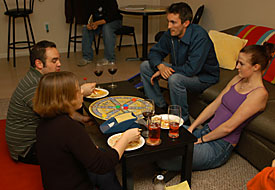 |
|
DAVID HARDEN/Arizona Daily Wildcat
|
Right to left clockwise; UA students Brendan Tarnay, Claire Mcinnes, Samantha Scaife and Greg Lenaburg relax with a game of Trivial Pursuit Sunday at Sterling University Apartments. The group gathers every week to play board games. Games such as Taboo and Cranium are making a comeback in popularity among university students.
|
|
By Nate Buchik
Arizona Daily Wildcat
Tuesday February 4, 2003
Drinking and video games are not the only kinds played by students on weekends
In this advanced age, where computers rein and cyberspace is the final frontier, there are some who still entertain themselves away from a screen.
These are the board gamers ÷ individuals who are lost among a sea of X-Cubes and RPGs. These old souls thrive on social interactions in settings among friends who, like them, enjoy using more creative sides of their brains while giving their thumbs a rest.
"I had to play a lot of board games with my family, but I like to play at college because there's not much else to do," said Greg Lenaburg, a freshman majoring in Spanish. "I mean, there's only so many times you can go out and get drunk per weekend."
For college students, board games can be repressed in childhood memories of senile grandparents asking for "just one more round of Parcheesi." These students don't know that some of these games can actually be fun.
Trying to prove this point and score some free entertainment were a group of friends attending a "board game party" at the apartment of Claire McInnes, a microbiology junior.
"You can never have enough board games in your life," McInnes said.
Played with the right people, a new wave of interactive team games ÷ Taboo, Catch Phrase, Scattergories or, the one that combines all others, Cranium ÷ are providing laughs and cheap thrills to college students.
They also provide a "good, clean fun" break from the fast-paced college life.
"We're really just playing games on a Sunday night because we've been drinking all weekend and our livers can't handle any more," said Sherra Stewart, an art history senior.
Pushing aside old favorites like Scrabble, Boggle and Sorry, Taboo and other games that emphasize communication skills and team-play are more appealing to a college-aged market.
"Games where you describe things and you play off of your teammates, they're more about the people, and less about the game," said Samantha Scaife, a freshman majoring in English.
Quickly becoming the most popular of these games is Cranium, a game you've probably seen (there are usually a lot of them being sold in Starbucks, and there are a lot of Starbucks). Launched in 1998, Cranium requires teams to hone essential skills such as humming, sculpting and spelling backwards while performing tasks from classic games like Charades, Pictionary and Trivial Pursuit.
"With Monopoly, the rules and limits of the games are set out. With these team games like Cranium, you make the game," Scaife said. "It's never the same thing."
Scaife and others at the party felt board games were a better fit for people who actually enjoyed interacting with their friends.
"With video games, people end up watching the screen. This way, everyone can get involved," Scaife said.
While "board games are for losers" might be a common thought among readers, Stewart said board gaming is no different from other, more impairing types of gaming.
"When you're at a real party, you play drinking games so you can hang out with your friends and (mess) around. It's the same thing," Stewart said.
For those still not convinced, Stewart suggested adding Īdrunk' as a prefix to any of the board games to create an exciting new way to have fun.
Somehow, I don't think "Drunk-Operation" will ever catch on.

